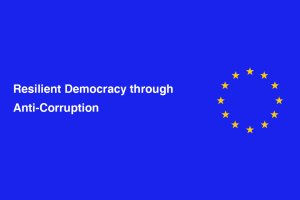
Resilient Democracy through Anti-Corruption
Project Description
The Resilient Democracy through Anti-Corruption is a project designed to enhance democratic integrity and resilience against electoral corruption. The project aims to strengthen institutional capacities, enhance inter-agency synergies and legal frameworks, and enable effective civil society oversight, along with public resilience, while aligning closely with Moldova’s international and national commitments on governance, rule of law, and anti-corruption.
To strengthen investigation capacities, specialised equipment and software will be provided to four law enforcement and investigation institutions: the National Anti-Corruption Centre, the Office for Prevention and Combatting of Money Laundering, the General Police Inspectorate, and the General Prosecutor’s Office. Information-sharing and coordination among the respective institutions will be enhanced. Raising awareness campaigns and civic education initiatives will be conducted to increase understanding of the consequences of electoral corruption and empower citizens to make independent and informed electoral choices. In parallel, the project will enhance civil society and investigative journalists’ capacities to expose electoral corruption, increase transparency and foster greater civic engagement.
To strengthen investigation capacities, specialised equipment and software will be provided to four law enforcement and investigation institutions: the National Anti-Corruption Centre, the Office for Prevention and Combatting of Money Laundering, the General Police Inspectorate, and the General Prosecutor’s Office. Information-sharing and coordination among the respective institutions will be enhanced. Raising awareness campaigns and civic education initiatives will be conducted to increase understanding of the consequences of electoral corruption and empower citizens to make independent and informed electoral choices. In parallel, the project will enhance civil society and investigative journalists’ capacities to expose electoral corruption, increase transparency and foster greater civic engagement.
Specific Objective
1. Strengthened institutional capacities for detecting, investigating, prosecuting, and adjudicating, as well as decrease corruption-related cases with a specific focus on electoral integrity and illicit political finance;
2. Enhanced inter-agency coordination, cohesion and synergy between law enforcement, anti-corruption agencies, judicial institutions, and other relevant entities, while facilitating legal and procedural reforms;
3. Strengthened civil society and media oversight, along with public resilience to expose and track corrupt practices, enhance public scrutiny, and foster transparency, accountability, and civic engagement in democratic processes.
2. Enhanced inter-agency coordination, cohesion and synergy between law enforcement, anti-corruption agencies, judicial institutions, and other relevant entities, while facilitating legal and procedural reforms;
3. Strengthened civil society and media oversight, along with public resilience to expose and track corrupt practices, enhance public scrutiny, and foster transparency, accountability, and civic engagement in democratic processes.
Expected Results
1. Assessments of institutional weaknesses, operational gaps, and reform priorities have provided a strong foundation for targeted long-term efforts to strengthen law enforcement’s capacities.
2. Law enforcement officers have enhanced capacity to detect, investigate, and prosecute, as well as decrease corruption-related cases, including electoral integrity and illicit political finance.
3. The investigative effectiveness of law enforcement agencies has been enhanced through the provision of digital tools and specialised equipment.
4. Prosecutors and judges have enhanced capacities to handle corruption cases, including those related to electoral integrity and illicit political finance.
5. A sustainable mechanism for inter-agency coordination, cohesion, and synergy has been formalised and operationalised. 6. Relevant legal and procedural frameworks related to corruption risks to democratic integrity have been aligned with international standards.
7. Media professionals and investigative journalists have strengthened capacity to monitor, analyse, and report on corruption practices affecting democratic integrity.
8. Public awareness campaigns and grassroots education initiatives have contributed to shifting perceptions of corruption practices, including those related to democratic integrity, fostering broader civic resilience and participation.
2. Law enforcement officers have enhanced capacity to detect, investigate, and prosecute, as well as decrease corruption-related cases, including electoral integrity and illicit political finance.
3. The investigative effectiveness of law enforcement agencies has been enhanced through the provision of digital tools and specialised equipment.
4. Prosecutors and judges have enhanced capacities to handle corruption cases, including those related to electoral integrity and illicit political finance.
5. A sustainable mechanism for inter-agency coordination, cohesion, and synergy has been formalised and operationalised. 6. Relevant legal and procedural frameworks related to corruption risks to democratic integrity have been aligned with international standards.
7. Media professionals and investigative journalists have strengthened capacity to monitor, analyse, and report on corruption practices affecting democratic integrity.
8. Public awareness campaigns and grassroots education initiatives have contributed to shifting perceptions of corruption practices, including those related to democratic integrity, fostering broader civic resilience and participation.
Project documents
Beneficiaries

The General Prosecutor’s Office

The General Police Inspectorate

The Office for Prevention and Combating of Money Laundering

The National Anticorruption Centre
Project map
Photo gallery
Videos
PROJECT DETAILS
Moldova
Priority Area:
Partnership that empowers, Partnership that connects Subsector:
Civil society, Digital (broadband, mobile, eGov, digital innovation, cyber) Topic:
Anti-corruption, Dialogue, Civil society, Digital, Education, Justice, Women, Youth, Communication, Skills Project Status:
Ongoing Start Date:
10.03.2025 End Date:
09.09.2026 Social Media Links:
https://www.facebook.com/PNUDMoldovahttps://www.youtube.com/@UNDPinMoldova
https://x.com/UNDPMoldova
https://www.linkedin.com/company/undp-moldova/posts/?feedView=all
https://www.instagram.com/undpmoldova/
EU Project Number:
484-092 